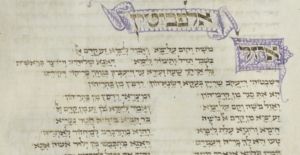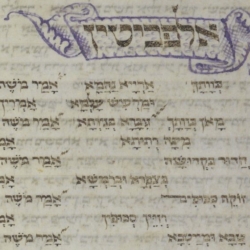Since the use of targum became a special rare occasion, Jews did what we do for special rare occasions — we write piyyutim. An extensive series of Aramaic piyyutim were written, to be inserted into the recitation of the targum (or the ‘seder meturgeman’) itself. On Shavuot, a massive series of piyyutim, one for every one of the ten commandments and then some, were written. On Pesaḥ, a similar number of piyyutim were composed for important moments.
Since the mass acceptance of the Shulḥan Arukh, the custom of the recitation of the targum on these special days has been lost from Ashkenazi practice, and as a consequence the vast majority of the seder meturgeman piyyutim themselves have been abandoned. A small number of Shavuot seder meturgeman piyyutim are still in use (specifically, Aḳdamut Milin and Yetsiv Pitgam), but taken out of their original context. (As an example, why do we read Yetsiv Pitgam after the first verse of the haftarah? Because it’s meant to introduce the targum!)
I personally love Aramaic, piyyutim, and liturgy, so I’ve taken it upon myself to translate a selection of seder meturgeman piyyutim. This piyyut, Izel Moshe (Arise, Moses), the fifth in a series of Aramaic piyyutim from the seventh day of Pesaḥ, is meant to be recited after the second verse of the song proper, as an elaboration on God’s strength. The English translation preserves the Hebrew acrostic of the original.
| Source (Armaic) | Source (English) |
|---|---|
אִזֵל מֹשֶׁה וְקוּם עַל־יַמָּה וְאֵמוֹר לְיַמָּה זוּעַ מִן־קֳדָמַי בִּשְׁמִי תֵּיזִיל וְתֵימוֹר לְיַמָּה דַּאֲנָה הוּא שְׁלִיחֵיהּ דְיוֹצֵר בְּרֵאשִׁית גַּלִּי אׇרְחָךְ שָׁעָה זְעוּרָה עַד־דְּיַעְבּרוּן בְּגַוָּךְ רְחִימוֹי קִירִיס דְּשִׁבְטוֹי דְּיַעֲקֹב שָׁרְיֵי בְּעָקָה דְּהָא סַנְאֵיהוֹן רַדְפִין בַּתְרֵהון הָכָה יַמָּה סָגַר מִן־קֳדָמֵיהוֹן וְסַנְאָה רְדֵיף מִן־בַּתְרֵהון וְאִזֵל מֹשֶׁה וְקוּם עַל־יַמָּה וְאָמַר לְיַמָּה זוּעַ מִן־קֳדָמַי |
Arise, Moses, get up against the sea, and say to it, “Move from before me!” By My name go, and say to the sea that “I am the emissary of the Crafter of Creation. Grant us the way for but a moment until the beloved of the Kyrios can pass through. Direly trapped are Jacob’s tribes, for the bigots chase after them! Even now the sea cuts them off, and the bigot chases behind them!” Vamoose! Arise against the sea, and say to it, “Move from before me!” |
זַע יַמָּה מִן־קֳדָם מֹשֶׁה כַּד חֲמָא בִּידֵיהּ חוּטָר נִסַּיָּיה חֵמָה רַבָּה עָלַת בְּיַמָּה וְשָׁרֵי מִתְרַבְרַב עִם־מֹשֶׁה טְעוֹ הֵיא לָךְ בְּרֵיהּ דְעַמְרָם דְּלֵית אֲנָה מִתְכְּבֵשׁ מִן־יְלִיד דְּאִתָּה יוֹמִין תְּלָתָה אֲנָה רַב מִינָּךְ וְהֵיך אַתְּ יְכִיל לְמֵכְבּוֹשׁ יַתִי |
Zigzagging away from before Moses, the sea saw that his hand had the miracle staff. Hot rage rose up in the sea, and it began to argue with Moses: “T’is you in the wrong, son of Amram! for “I will not be forced by one born of woman! In three[1] The sea was made on the third day, while humanity was made on the sixth. I am greater than you, how could you force me?” |
כַּמָה אַתְּ מִתְרַבְרַב אַמָר לֵיהּ מֹשֶׁה דְּלָא בְּטֵבוּתָך אַתְּ מִתְכְּבֵשׁ לַמָה אַתְּ לְקוֹבְלִי וַאֲנָה לְקוֹבְלָךְ הַדָּה שַׁעְתָּה לָא שָׁעְתָּא דְּדִינָא מֶלֶךְ מַלְכַיָּה שַׁלְחִי לְגַבָךְ לְמַעְבְרָה בְּגָוָּךְ בְּנוֹי דִרְחִמֵיהּ נִחֵת מֹשֶׁה וְקָם עַל־יַמָּה וְלָא בְּעָה לְמַשְׁלוֹם גָרְמֵיהּ |
“Can you stop arguing?” replied Moses. “For regardless of your desire, you will be forced. Look, why are we facing each other? At this time, it is not a time for debate. Monarch of monarchs sent me to you, to let the beloved children pass through.” Now he went down against the sea, but it did not want to give up. |
סוֹף מִלְיָה אָמַר יַמָּה לְמֹשֶׁה דְּלֵית אֲנָה מִתְכְּבֵשׁ מִן־יְלִיד דְאִתָּה עָנָה מֹשֶׁה וְאָמַר לְיַמָּה דִּזְעוּר מִינָּךְ הוּא מֵכְבַּשׁ לָךְ פָּתַח פֻּמֵיהּ יַמָּה וְאַמָר לְמֹשֶׁה בְּרֵיהּ דְעַמְרָם לָא תִּתְרַבְרַב צָוָח מֹשֶׁה מִן־כׇּל חֵילֵיהּ וְיַמָּה לָא בְעָה לְמַכְבוֹש גָּרְמֵיהּ |
Soon the sea said to Moses that “I will not be forced by one born of woman!” On this, Moses said back to the sea that “this one smaller that you will force you!” PRoclaimed the sea to Moses, “Son of Amram, don’t argue with me!” CHanneling all his power Moses cried, but the sea did not want to give up. |
קָל רוּחַ דְּקֻדְשָׁא קְרָא לְמֹשֶׁה וְאִשְׁתְכַח דְּבִירָה מַמְלַל עִמֵהּ רַמָה יְהַב לְמֹשֶׁה חוּטָר נִסַיָּיה לְמֶהֱוֵי רְדֵי בֵּיהּ כׇּל־אוּמַיָּיה שָׁמַע יַמָּה דְּבִירָה מַמְלַל עִם־מֹשֶׁה מִגוֹ־נוּרָא תָּהָא יַמָּה מִן־כׇּל־חֵילֵיהּ וְעָבְרוּן בֵּה שִׁבְטוֹי דְּיַעֲקֹב |
Quoth the spirit of holiness to Moses, and made his speech manifest to talk with him. Rendering to Moses the miracle staff, The High One ensured he would defeat nations. Sure enough the sea heard the speech, speaking with Moses from the flame. THe sea was empty of its force, and Jacob’s tribes passed through it. |
Notes
| 1 | The sea was made on the third day, while humanity was made on the sixth. |
|---|

“אִזֵל מֹשֶׁה | Izel Mosheh (Arise, Moses) — a piyyut for the Seder Meturgeman of the 7th Day of Pesaḥ” is shared through the Open Siddur Project with a Creative Commons Attribution-ShareAlike 4.0 International copyleft license.










Leave a Reply